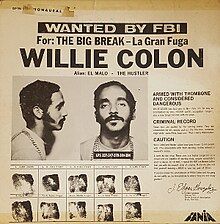La Gran Fuga
Appearance
| La Gran Fuga | ||||
|---|---|---|---|---|
 | ||||
| Studio album by | ||||
| Released | 1970 | |||
| Genre | post-Boogaloo Salsa music | |||
| Label | Fania Records | |||
| Willie Colón chronology | ||||
| ||||
| Review scores | |
|---|---|
| Source | Rating |
| AllMusic | |
| The Encyclopedia of Popular Music | |
| MusicHound World | |
La Gran Fuga (The Great Escape) is an album of Willie Colón & Héctor Lavoe issued in 1970 by Fania Records.[4][5] It was the second of Colón and Lavoe's records to go gold, after Cosa Nuestra (1970) and before El Juicio (1972).[2]
Track listing
[edit]- "Ghana' E" (Willie Colón & Héctor Lavoe) – 4:01
- "Pa' Colombia" (C. Curet Alonso) – 5:47
- "No Cambiare" (Willie Colón & Héctor Lavoe) – 3:37
- "Sigue Feliz" (Carlos Román) – 4:12
- "Barrunto" (C. Curet Alonso) – 5:52
- "Abuelita" (Willie Colón & Héctor Lavoe) – 4:21
- "Panameña" (Willie Colón & Héctor Lavoe) – 6:36
- "Canción Para Mi Suegra" – 0:55
References
[edit]- ^ La Gran Fuga at AllMusic
- ^ a b Colin Larkin (1998). "Colón, Willie". The Encyclopedia of Popular Music. Vol. II (3rd ed.). Muze. p. 1180–1. ISBN 0-333-74134-X.
- ^ Adam McGovern, ed. (2000). "Willie Colón". MusicHound World: The Essential Album Guide. Visible Ink Press. p. 169–171. ISBN 1-57859-039-6.
- ^ Juan Flores - Salsa Rising: New York Latin Music of the Sixties Generation 2016 0190499532 "The defining role of Lavoe's colloquial Spanish in the performance of these songs is obvious, as are the historic compositions of the revered songwriter from Puerto Rico, Tite Curet Alonso, in much of Colón's repertoire. ... and violence of the first four, and anticipating the next four to come, La Gran Fuga (The Great Escape), El Juicio (The Verdict), Lo Mato (I'll Kill Him), and Crime Pays (title in English)."
- ^ Music, Writing, and Cultural Unity in the Caribbean Timothy J. Reiss - 2005 p 240 "All contributed to create the image of Colon and Lavoe as the bad guys of salsa and their band as a gang of the Latin community. After Lo mato, Colon broke up the group in order to make other experiments with Latin music (Rondon).
